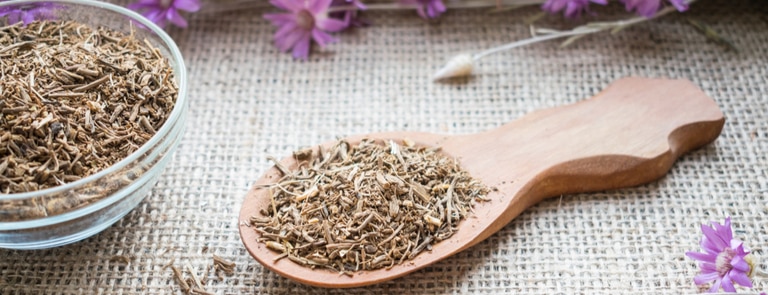10% off £35
Your ultimate guide to plant based protein
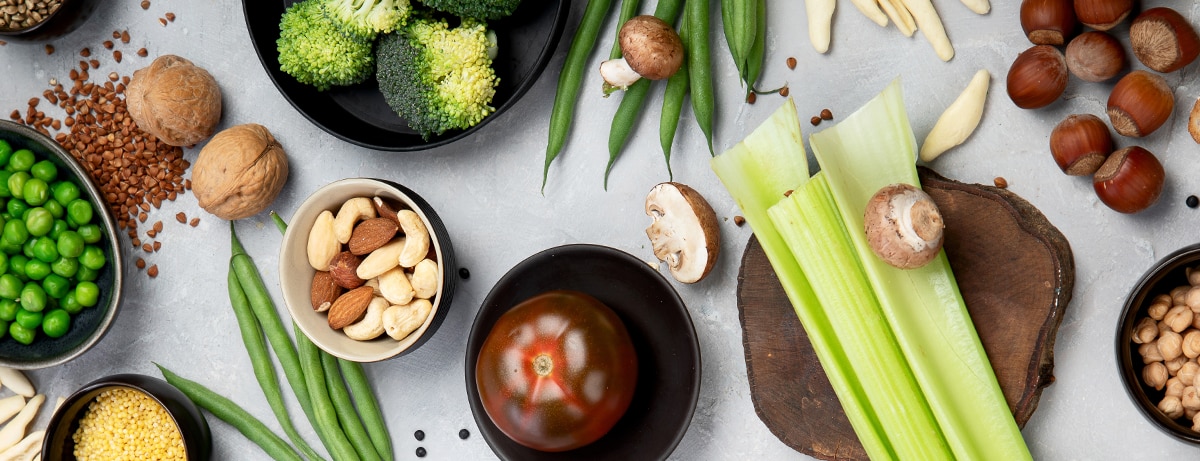
Most of us know that you can actually get plenty of protein from a plant-based diet. However historically, ‘good’ protein sources are often presented to us in the form of big, juicy steaks or lean chicken breasts. But the truth is, you can get all the protein you need by eating plants.
So, whether you’re trying to cut down on animal products for ethical, environmental or health reasons, you don’t need to panic. You can get all the protein you need with plants.
What is plant protein?
Plant protein is just the same as any other protein – an essential part of our nutrition that contributes to growth and maintenance of our skin, muscle, internal organs, eyes, nails and hair, as well as support our immune system.1,2,3 The only difference is that a plant-based protein must come from a plant!
Top 10 plant-based protein sources
Most plants contain protein, even if it is just a little. Some are more protein-rich than others, though, here are ten of the best high-protein plant-based foods:
- Hemp seeds, approx. 32g protein per 100g 4
- Pumpkin seeds, approx. 30g per 100g5
- Peanut butter, approx. 22g protein per 100g6
- Almonds, approx. 21.2g protein per 100g7
- Tempeh, approx. 20g protein per 100g8
- Cashew nuts, approx. 18g protein per 100g9
- Chia seeds, approx. 17g protein per 100g10
- Walnuts, approx. 14.7g protein per 100g11
- Hazelnuts, approx. 14.2g protein per 100g12
- Edamame beans, approx. 11g protein per 100g13
Learn more about the best vegan and vegetarian protein sources.
Plant protein vs. animal protein
Protein can be broken down into 22 amino acids, aka the ‘building blocks’ of protein. 9 of these amino acids are classed as ‘essential’, meaning our bodies can’t make them and we must therefore get them from our diet.14
Now, most animal sources of protein e.g. eggs, meat, fish are complete proteins – meaning they contain all the essential amino acids we need from our diet all in one handy foody package.15
However, only certain high protein plant foods are complete proteins though, like:
- Soy (tofu, tempeh, edamame beans, protein powder, soya milk & some mock meats)16
- Pea protein powder17
- Buckwheat18
- Quinoa 19
- Amaranth20
- Chia seeds 21
- Ezekiel bread – made with wholegrains like wheat, barley, lentils, and spelt, then combined with sprouted legumes 22
- Nutritional yeast 23
- Mycoprotein (Quorn) 24
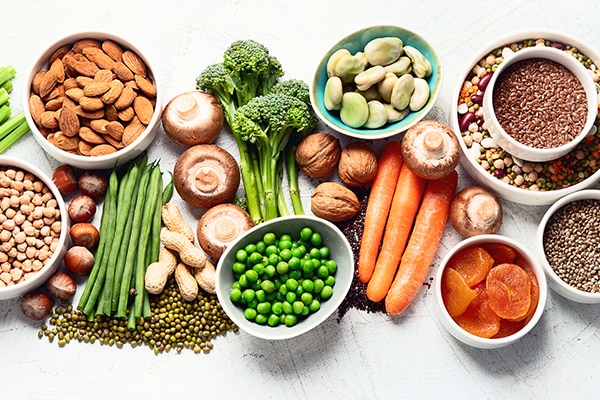

Other plants high in protein contain varying amounts of essential amino acids, which when combined with another plant-based protein source, can become complete. For example, eating the foods like hummus and wholemeal pitta, rice and beans or peas, peanut butter on wholemeal toast or wholemeal pasta and peas together may provide your body with complete protein.This means that as long as you’re eating a range of healthy plant protein foods, including some complete plant proteins, you should be getting all you need and more! 25
Plant proteins may also come with an abundance of other healthy goodies, like vitamins, minerals, antioxidants, fibre, carbohydrates, so you can take your plant protein with a side of extra health benefits.
How do you get enough protein in a plant-based diet?
It is recommended that most people should consume 0.75g of protein per kg of their bodyweight every day. To put this into perspective, a person who weighs 72kg would need 72 x 0.75g of protein per day, which equals 54g.26
However, if you are working out often, want to lose weight or are an athlete, you may need a little more.
As long as you try and stick to these guidelines and make sure you’re eating a varied lot of plant proteins to get all your essential amino acids, it doesn’t matter if you get them from plants or animals.
What is the best plant-based protein?
The best way to hit your protein goals is to eat a varied and abundant diet, and most people who don’t exercise on a regular basis and only need the minimum 0.75g of protein per kg usually get enough protein without really trying.27
But we get it, sometimes life gets in the way and it’s hard to be so precise with your meal planning if you need extra protein, especially if you’ve ditched animal products or are training heavy. This is where protein supplements can come into play – providing you with a quick and easy protein hit before / after working out, in between meals or even in place of them.
We’ve put together six of the best plant protein powders for you if you need a little extra help.
6 of the best plant-based protein powders
1. Soy protein powder
One of the best plant protein powders is made from the long-standing plant-based hero: soy.
It’s usually made from soybean flakes that go through a process of fat removal and being washed in water or alcohol to remove their sugar and dietary fibre so that you can enjoy them in a pure-protein form.
As we have mentioned above, soy is a complete protein all by itself – it has all of the essential amino acids our bodies cannot make, making it a great protein powder. Here are some of its benefits:
- Supports muscle growth
- High protein percentage
- Low in fat
- Suitable for vegans and dairy free
Our soy protein pick
Pulsin Soya Protein 250g Powder
Pulsin Soya Protein 250g Powder
Suitable for vegans, this 100% soya protein powder is a complete plant-based protein. Offering a whopping 90% protein content, this option is a great way to increase your protein intake without having to use any animal products. Plus, it’s also packed with isoflavones which are a type of polyphenol found in soy and soy products.
This versatile vegan protein powder is unflavoured, meaning you can add any flavours that you wish to get it exactly to your tastes. Just a 10g serving has 9g of protein, pretty impressive right?
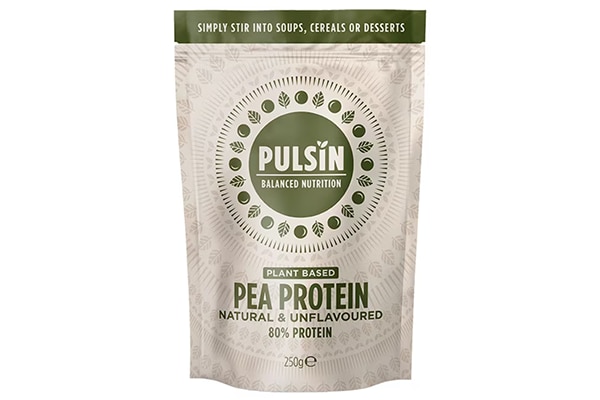

2. Pea protein powder
Another of the highest plant based protein foods is pea protein. Yes, you heard that right, peas = protein! Even more impressive, it’s considered a complete protein and contains all the essential amino acids.29
Pea protein powder is usually made by isolating the protein of yellow peas, e.g. taking out their natural carbohydrates and fats, to make sure all you’re getting is the protein goodness.
Precision Engineered Plant Protein Vanilla Cream, 784g
Precision Engineered Plant Protein Vanilla Cream, 784g
This creamy, dreamy plant protein powder is made of pea protein combined with rice protein to fill you up with 20g of protein per serving.
It may be low in sugar but that certainly doesn’t reflect in the delicious vanilla taste – and it’s totally vegan-friendly too!
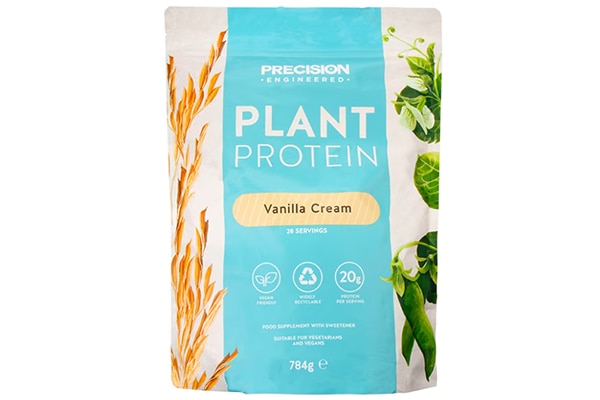

3. Hemp protein powder
Hemp protein powder is made from pressed and ground seeds from the hemp plant. This process removes most of the fat, while keeping all of the essential amino acids, as well as a small amount of essential fats and fibre. Here are some of the benefits:
- Rich in fibre30
- High in protein
- Contains some healthy fats, like omega 331
- Full of essential minerals like iron and magnesium32
Naturya Organic Hemp Protein Powder 300g
Naturya Organic Hemp Protein Powder 300g
This plant-based protein powder by Naturya is suitable for vegans and is made from cold pressed hemp seeds that have been milled, creating a fine protein-dense powder that has an earthy flavour.
There are so many ways to use vegan protein powder like this one, for example you could add it to smoothies, milkshakes, granola, energy bars, biscuits or pastries – the possibilities are endless. A 20g serving will provide you with 10g of protein.
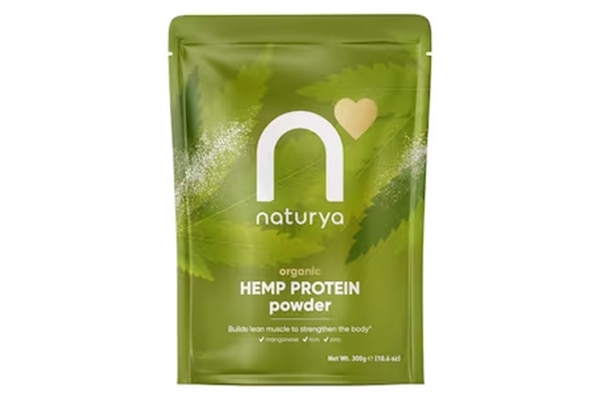

4. Diet plant protein powder/meal replacements
Protein can help you to feel fuller and more satisfied for longer, which can help you maintain a healthy weight as if you are feeling full, you probably won’t be feeling the urge to snack as much!33,34
That’s why some people like to incorporate a high-protein meal replacement shake into their diet. Luckily, there are some super plant-based meal replacement shakes available, which work just the same.
USN Diet Fuel Vegan Meal Replacement Shake Strawberry, 880g
USN Diet Fuel Vegan Meal Replacement Shake Strawberry, 880g
One of the best plant-based diet protein options on the market, this USN meal replacement shake contains 26g of protein per serving and can be used once a day to substitute a meal.
This formula is made of a blend of pea protein isolate, soya protein isolate and rice protein concentrate – triple plant protein power!
These shakes are great for those who want to lose weight or maintain their weight loss, while helping them to smash their protein goals.
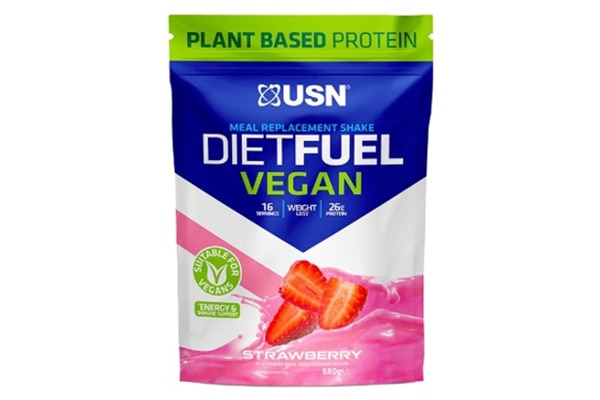

6. Other protein snacks
Like to enjoy your protein out and about – no shaker required? A plant-based protein snack could be right up your street.
Take this one by Misfits for example:
Misfits Chocolate Hazelnut Vegan Protein Bar 45g
Misfits Chocolate Hazelnut Vegan Protein Bar 45g
With 15g of soy protein and less than 1g of sugar, these delish chocolate and hazelnut bars make pretty nutritious snack – especially if you compare them to your regular sugar-laden snack bars!
The beauty of these bars is that they can satisfy sweet cravings two-fold, with their high protein content and lush chocolate coating. And, even better, you can enjoy them on the move, no shaker necessary.
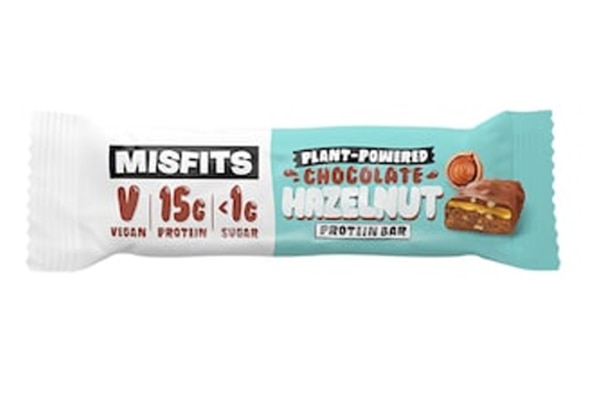

The final say
And that wraps up our article on all things plant protein! Now you know about all the vegan protein sources, you should be feeling a little more clued up on how to increase your intake going forward. We also hope that you’ve found the best vegan protein powder to suit your needs, tastes and dietary requirements after reading through this content.
1. https://pubmed.ncbi.nlm.nih.gov/32761577/
3. https://pubmed.ncbi.nlm.nih.gov/17403271/
4. https://www.nutritionvalue.org/Seeds%2C_hulled%2C_hemp_seed_nutritional_value.html
6. https://www.nutritionvalue.org/Peanut_butter_nutritional_value.html
7. https://www.nutritionvalue.org/Almonds%2C_unsalted_42101130_nutritional_value.html?size=100+g
8. https://fdc.nal.usda.gov/fdc-app.html#/food-details/174272/nutrients
9. https://www.nutritionvalue.org/Nuts%2C_raw%2C_cashew_nuts_nutritional_value.html
10. https://www.nutritionvalue.org/Seeds%2C_dried%2C_chia_seeds_nutritional_value.html
11. https://www.nutrition.org.uk/nutritionscience/nutrients-food-and-ingredients/protein.html?start=4
12. https://www.nutrition.org.uk/nutritionscience/nutrients-food-and-ingredients/protein.html?start=4
13. https://www.nutritionvalue.org/Edamame%2C_unprepared%2C_frozen_nutritional_value.html
14. https://www.ncbi.nlm.nih.gov/books/NBK234922/
15. https://www.nutrition.org.uk/healthy-sustainable-diets/protein/?level=Consumer
16. https://www.sciencedirect.com/topics/agricultural-and-biological-sciences/soy-protein
17. https://www.aicr.org/resources/blog/health-talk-pea-protein-is-everywhere-is-it-healthy/
18. https://www.ncbi.nlm.nih.gov/pmc/articles/PMC5977093/
19. https://www.hsph.harvard.edu/nutritionsource/food-features/quinoa/
20. https://www.ncbi.nlm.nih.gov/pmc/articles/PMC5977093/
21. https://www.hsph.harvard.edu/nutritionsource/food-features/chia-seeds/
22. https://pubmed.ncbi.nlm.nih.gov/24583381/
23. https://www.ncbi.nlm.nih.gov/pmc/articles/PMC8780597/
24. https://www.ncbi.nlm.nih.gov/pmc/articles/PMC6554455/
25. https://www.hsph.harvard.edu/nutritionsource/what-should-you-eat/protein/
26. https://www.nutrition.org.uk/healthy-sustainable-diets/protein/?level=Health%20professional
27. https://www.nutrition.org.uk/healthy-sustainable-diets/protein/?level=Health%20professional
28. https://www.sciencedirect.com/topics/agricultural-and-biological-sciences/soy-protein
29. https://www.aicr.org/resources/blog/health-talk-pea-protein-is-everywhere-is-it-healthy/
30. https://fdc.nal.usda.gov/fdc-app.html#/food-details/2339273/nutrients
31. https://www.sciencedirect.com/science/article/abs/pii/S0889157513000094
32. https://www.ncbi.nlm.nih.gov/pubmed/28804797
The advice in this article is for information only and should not replace medical care. Please check with your GP or healthcare professional before trying any supplements, treatments or remedies. Food supplements must not be used as a substitute for a varied and balanced diet and a healthy lifestyle.

